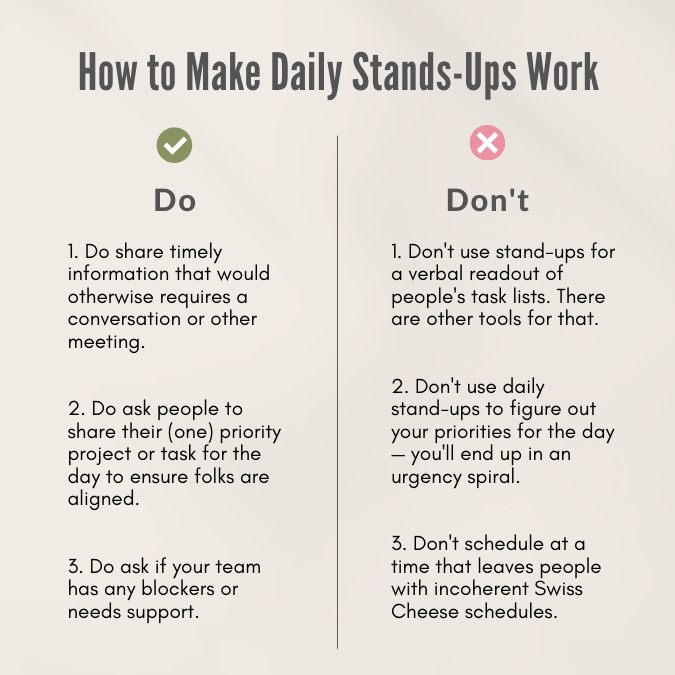Does Your Team Really Need a Daily Stand-Up Meeting?
Probably not, but here's how to make them worth the cost
Most daily stand-up meetings make whatever they're trying to solve worse as a result of eating up team time and focus.
First, let's look at real meeting math. The daily stand-up isn't just the 15-30 minutes of the stand-up — when we talk about meetings, we also need to include the prep, post, and slack time. That stand-up meeting eats up at least one hour of teammate time — so if you have five teammates, that's at least 5 hours of team time.
Five hours of team time per day per week adds up; given that the average knowledge worker makes ~$30 per hour, that's $3,000 per month in wages for just this meeting, for five people.
Should you still decide to do daily stand-ups, despite knowing this, here's what not to do:
Don't use stand-ups as a verbal readout of people's task lists. You'll get far too much noise and undermine the chances of people actually using their work management software.
Don’t use them to figure out your priorities for the day. This is the surest way to get caught up in the urgency spiral, where the urgent always outweighs the important. The work that would most move the needle gets constantly neglected in favor of reacting to and putting out the next tiny fire on deck.
Don’t schedule stand-ups at a time that makes people end up with incoherent Swiss Cheese schedules. For instance, having a meeting at 9:30 (when people start work at 9) means most people can't or won't be able to commit to deep/focus work for the whole morning. They'll spend the time after the meeting getting re-sorted, doing a bit of work, and then start transitioning to lunch. Better to do it at 11 am so people can have a full focus block in the morning and then transition to lunch since they're going to be doing that anyway.
Here's what TO do:
DO share timely information that requires some conversation or questions for clarification. Playing 20 questions on Slack or Teams all day is worse than having a quick convo to discuss the specifics of a project.
DO ask people to share their (one) priority project or task for the day. This makes prioritization a team habit and ensures folks are aligned.
DO ask if your team has any blockers or support needs. Build the team habit of team members helping identify each other’s blockers and support needs, while normalizing the reality of blockers and needs for support. (Don't penalize people asking for support or bringing up potential blockers.)
As I write in Team Habits, most bad or counterproductive meetings are a result of other poor team habits. If your team's habits around decision-making, prioritization, and collaboration aren’t working, you’ll end up having a lot of crutch meetings to address those issues.
But crutch meetings cost your team's most precious resources: their time and their attention.
This means that often, the best way to fix bad meeting culture isn't just to work on improving meetings and adding new ones. It's by starting with the root issue with your team habits, that is, working on decision-making, planning, communication, so that the endless unproductive meetings won’t need to keep happening.
I'll turn it over to you: if you're doing daily stand-ups, what are the root challenges or (bad) team habits that are creating the need for the daily stand-ups?
Note: this post was originally published on Productive Flourishing.




